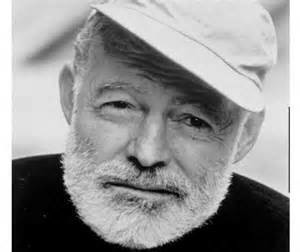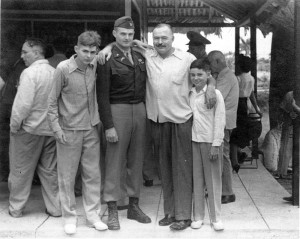The below well-written article by Lyz Lenz captures how Hemingway sneaks up on you. I too started out not liking the clipped sentences and actually disliked his subject matter. As I became fascinated by him as a persona, I went back to read his works. And there it was. I still hate some of his topics but I realized that at its heart, his stories and novels are really just about life and love, getting it, losing it, coping with both. He doesn’t sugar coat it and leaves it raw, and yet therein is its power. I shortened the article slightly. Well said, Ms. Lenz.

How Ernest Hemingway taught me to love baseball
By Lyz Lenz | Dec 2, 2016
In college, when I began dating the man who would become my husband, he told me that his family loved baseball.
”

To understand us, you have to understand baseball,” Dave once told me over a dinner of burgers at our favorite diner. I shrugged.
The second year we were dating, I started my senior year of college. One of the classes I signed up for was on Ernest Hemingway and William Faulkner. I loved Faulkner, whose wild characters and dense prose often made me laugh out loud. But I cared nothing for Hemingway. I hated his female characters and the cold feel of his short sentences. But I couldn’t take a class on one without the other, so I signed up.
We began that semester with Hemingway’s short stories, starting with the collection “The Snows of Kilimanjaro” and then moving onto “In Our Time.” I was surprised at how often sports were on the periphery of his writing — the depressed prize fighter in “The Killers,” the match fixing in “Fifty Grand” and hunting in “The Short Happy Life of Francis Macomber.”
It was something I’d never noticed before, how consumed with physical action his characters were, how sport gave them an identity, whether real or imagined, that could in turn devastate and define who they were.
I told Gary I was reading Hemingway.
“Oh, he’s my favorite author,” he said on one of my visits. I was shocked. I didn’t think he read anything besides books on management and Mickey Mantle biographies. He told me his favorite book was “Old Man and the Sea,” and I rolled my eyes.
“The Three-Day Blow” is everything I hate in a story — boys going into the woods to talk about women and get drunk. But when I read it that fall, I was 21 and in love with a boy who loved baseball. Reading the story again, I saw baseball in a way I’d never seen it before. Upset over a breakup, Nick Adams, a character who became an alter-ego for Hemingway, goes to a cabin with his friend Bill. They get drunk on whiskey and talk about women, but that topic contains mystery and heartbreak. So, they talk baseball. Alternating between love and disillusionment for the sport, their words become metaphors for the other things they can’t bring themselves to say. When Nick declares “…baseball is a game for louts” he might as well be saying “love is a game for louts.”
Baseball gives the two boys a common language and experience.
When all else failed, baseball was a way to be part of something together — some way to touch and connect with something great, to believe that whatever else fails, here is a thing that mattered, a place where winning was possible, and hope always prevailed.

That same semester, during Thanksgiving break, as I began to write my final paper for the class on baseball, Hemingway and love, Dave asked me to marry him under the stars while we danced as Carole King’s “Far Away” played from the CD player on his Mazda.

Lyz Lenz’s writing has appeared in The Washington Post, The New York Times, Marie Claire, Pacific Standard, Buzzfeed and the LA Review of Books. She lives in Iowa, but you can find her on Twitter @lyzl
